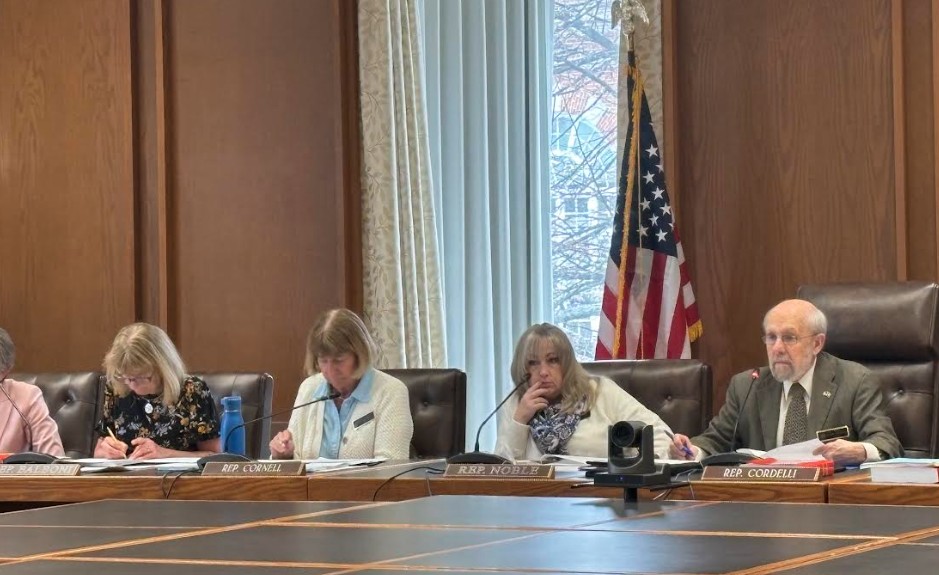By PAULA TRACY, InDepthNH.org
CONCORD – Bills that would allow parents to transfer their children to other schools within the same district, one that would study creating a county school district and one requiring public schools to adopt policies to limit the use of cell phones by students in classrooms across the state were all heard Monday in the House without opposition.
The three public hearings were among a handful handled by the House Education Policy and Administration Committee that have all passed through the upper chamber.
CELL PHONES
Senate Bill 206-FN, which would require school districts to adopt cell phone policies, passed on a voice vote in the Senate and is one favored by Republican Gov. Kelly Ayotte.
Tricia Melillo, majority caucus director for the New Hampshire State Senate, speaking on behalf of state Sen. Denise Ricciardi, the bill’s sponsor, introduced the measure.
She said the argument is that cell phone use in schools not only distracts students from their work, it leads to increased social anxiety and cyberbullying.
Melillo said it is a “a common sense solution to a growing issue.”
Rep. Loren Selig, D-Durham, asked what would happen if a school district decides not to enact one.
The bill has the word “shall” so some form of cell phone policy would likely need to be in place.
The effective date is 60 days after passage.
Rep. Stephen Woodcock, D-Conway, asked about the annual update required in the bill and about enforcement.
Rep. Peggy Balboni, D-Rye, asked if charter schools could also be included in the bill.
Rep. Patricia Cornell, D-Manchester, wondered if the bill’s sponsor would be amenable to adding other electronic devices.
Many schools already have cell phone policies.
Some asked if schools can already do this why does the state create a law that requires them and for them to be annually updated.
Selig asked if this was a local control issue.
Rep. Glenn Cordelli, R-Tuftonboro, who is chair of the committee, said the language could be changed and it is “just a matter of coming up with the right language.”
Rebecca Wilson, director of government relations for the NH School Boards Association testified in support of the bill on behalf of her organization but noted some concerns with some of the language in the bill, including that related to annual updates.
She said a large number of districts have cell phone policies for those with middle and high schools.
COUNTIES VERSUS SCHOOL ADMINISTRATIVE UNITS
Sen. Keith Murphy, R-Manchester, introduced his bill that would create a study committee to look at creating school districts by county, rather than local School Administrative Units to see if there could be some cost savings.
Senate Bill 57 would have a committee “analyze the administrative, financial, and logistical changes and outcomes from the transition from a municipal school district system to a county school district system. The committee shall consider reducing the number of SAUs in the state down to 12, one for each county and one each for Manchester and Nashua. The committee shall especially consider economies of scale for consolidation and impact of potential county taxes.”
It also would have the committee consult with county commissioners from each county, the New Hampshire Municipal Association and the New Hampshire School Boards Association and produce a report by Nov. 1, 2025.
Murphy said he was not sure if there would be a cost savings but it is worth an effort and said he would like to see the committee consult with anyone and everyone.
Asked about language changes, Murphy noted that the House has the discretion to change the bill.
“It’s your bill at this point,” he noted.
There are currently about 108 School Administrative Units in the state.
INTRADISTRICT PUBLIC SCHOOL TRANSFERS
A bill that would authorize parents to transfer their children to other school districts within their resident district as long as there is room was also heard by the committee Monday without opposition.
The cost of such a move was not able to be quantified by the Legislative Budget Assistant in January and that remains the case, said state Sen. Victoria Sullivan, R-Manchester.
She said her bill, Senate Bill 97-FN simply allows students to go to any school in their district so long as there is capacity.
She said she has worked with several families in Manchester who had reasons to ask to get their students moved and one reason has been childcare.
“Parents are just tired of the fights. They are paying the same taxes as everyone else,” she said.
Rep. Megan Murray, D-Amherst, asked about fiscal impact. Sullivan said there should not be a financial implication.
It relies on existing state law which has two parts and is called “Change of School or Assignment; Best Interest of Student” in RSA 193.
Currently, tuition into another school district involves “manifest educational hardship” and there are financial implications to that. But it also includes changes within districts which are based on “best interest.”
No committee votes were taken on the bills and they are due out of committee on May 29.





